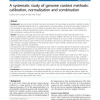Free Online Productivity Tools
i2Speak
i2Symbol
i2OCR
iTex2Img
iWeb2Print
iWeb2Shot
i2Type
iPdf2Split
iPdf2Merge
i2Bopomofo
i2Arabic
i2Style
i2Image
i2PDF
iLatex2Rtf
Sci2ools
166
click to vote
BMCBI
2010
2010
A systematic study of genome context methods: calibration, normalization and combination
Background: Genome context methods have been introduced in the last decade as automatic methods to predict functional relatedness between genes in a target genome using the patterns of existence and relative locations of the homologs of those genes in a set of reference genomes. Much work has been done in the application of these methods to different bioinformatics tasks, but few papers present a systematic study of the methods and their combination necessary for their optimal use. Results: We present a thorough study of the four main families of genome context methods found in the literature: phylogenetic profile, gene fusion, gene cluster, and gene neighbor. We find that for most organisms the gene neighbor method outperforms the phylogenetic profile method by as much as 40% in sensitivity, being competitive with the gene cluster method at low sensitivities. Gene fusion is generally the worst performing of the four methods. A thorough exploration of the parameter space for each meth...
BMCBI 2010 | Business | Gene | Genome Context | Phylogenetic Profile |
| Added | 12 May 2011 |
| Updated | 12 May 2011 |
| Type | Journal |
| Year | 2010 |
| Where | BMCBI |
| Authors | Luciana Ferrer, Joseph M. Dale, Peter D. Karp |
Comments (0)

